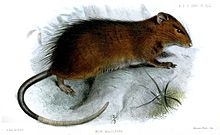Maclear's Rat
| Maclear's rat | |
|---|---|
 |
|
| Scientific classification | |
| Kingdom: | Animalia |
| Phylum: | Chordata |
| Class: | Mammalia |
| Order: | Rodentia |
| Family: | Muridae |
| Genus: | Rattus |
| Species: | R. macleari |
| Binomial name | |
|
Rattus macleari (Thomas, 1887) |
|
| Synonyms | |
|
Mus macleari Thomas, 1887 |
|
Mus macleari Thomas, 1887
Maclear's rat (Rattus macleari) was a large rat which lived on Christmas Island in the Indian Ocean. Abundant, unfamiliar with and seemingly unafraid of humans, large numbers of the creatures emerged and foraged in all directions at night. Making querulous squeaks, the rats entered the Challenger Expedition's tents and shelters, ran over sleepers, and upset everything in the search and fight for food. Maclear's rat may have been responsible for keeping the population of the Christmas Island red crab in check, as recent numbers of the crab are greater than in the past. It is thought that black rats inadvertently introduced by the expedition infected the Maclear's rats with a disease (possibly a trypanosome), which in turn may have contributed to the species decline. The last recorded sighting was in 1903, although it is possible that Maclear's rats formed hybrids with black rats. A hard tick, Ixodes nitens, described as an ectoparasite of Maclear's rat is also thought to be extinct.
Said to be related to Rattus xanthurus of Sulawesi and R. everetti of the Philippines, this species was grizzled brown above and lighter on the underside. The lower back had prominent long and black hairs that projected above the shorter fur. The base of the tail is dark while the distal half is scaly white.
The rat is named after Captain John Maclear (1838–1907) of the British survey-ship HMS Flying-fish who collected the specimen from Christmas Island in 1886. It was described as a new species by Oldfield Thomas the next year although it was originally described under the genus Mus. Maclear was earlier commander on HMS Challenger for the Challenger Expedition of 1872–1876 under its commission captain, Sir George Nares.
...
Wikipedia

